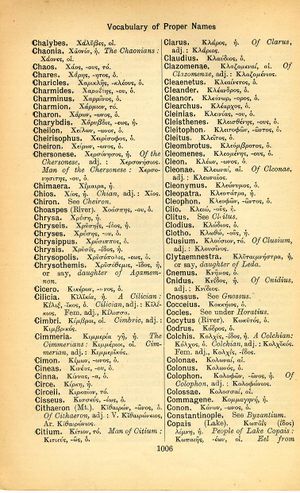Codrus: Difference between revisions
From LSJ
Δρυὸς πεσούσης πᾶς ἀνὴρ ξυλεύεται → Quercu cadente, nemo ignatu abstinet → Fiel erst die Eiche, holt ein jeder Mann sich Holz
(D_2) |
(Gf-D_2) |
||
| Line 1: | Line 1: | ||
{{WoodhouseENELnames | {{WoodhouseENELnames | ||
|Text=[[File:woodhouse_1006.jpg|thumb|link= | |Text=[[File:woodhouse_1006.jpg|thumb | ||
|link={{filepath:woodhouse_1006.jpg}}]][[Κόδρος]], ὁ. | |||
}} | }} | ||
{{Lewis | {{Lewis | ||
Revision as of 07:30, 14 August 2017
English > Greek (Woodhouse)
Κόδρος, ὁ.
Latin > English (Lewis & Short)
Cōdrus: i, m., = Κόδρος.
I The last Athenian king, who voluntarily devoted himself to death in order to obtain for his people victory over the Spartans, Cic. Tusc. 1, 48, 116; id. Fin. 5, 22, 62; id. N. D. 3, 19, 49; Hor. C. 3, 19, 2; Just. 2, 6, 19; Vell. 1, 2; Val. Max. 5, 6, 1.—
II A wretched poet, hostile to Virgil, Verg. E. 5, 11; 7, 22; Juv. 1, 2; 3, 203; 3, 208; cf. Weich. Poett. Latt. Rell. p. 402 sq.
Latin > French (Gaffiot 2016)
Codrus,¹⁴ ī, m.,
1 roi d’Athènes : Hor. O. 3, 19, 2
2 nom d’un berger : Virg. B. 5, 11
3 nom d’un poète : Juv. 3, 203.

